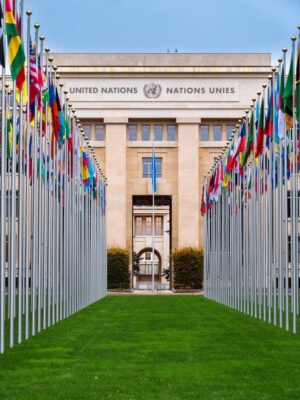The United Nations General Assembly will convene its September session in Geneva instead of New York, following the United States’ refusal to grant entry visas to Palestinian President Mahmoud Abbas and dozens of senior officials.
The relocation marks a rare institutional challenge to the host nation and reflects mounting global frustration over Washington’s obstruction of Palestinian participation amid Israel’s ongoing war on Gaza.
The U.S. State Department justified the visa denial on grounds of “national security,” accusing the Palestinian Authority and the Palestine Liberation Organization of “undermining peace efforts” through legal appeals to the International Criminal Court and the International Court of Justice.
These appeals include formal charges of genocide and apartheid against Israel, claims the U.S. argues breach diplomatic norms and politicize international legal forums.
The decision affects approximately 80 Palestinian officials, although the Palestinian Mission to the UN in New York will continue operating under a limited waiver.
The move has drawn sharp criticism from legal experts and international diplomats, who say it violates the 1947 UN Headquarters Agreement, which obligates the host country to facilitate access for all accredited delegations.
In 1988, the UN relocated its session to Geneva after the U.S. denied a visa to Yasser Arafat, then head of the PLO. The current relocation is similarly aimed at ensuring full Palestinian participation, particularly in a scheduled September 22 segment dedicated to Palestinian rights.
European leaders have condemned the U.S. decision. Spain’s Prime Minister described the move as “unjust,” while France reaffirmed that UN platforms must remain accessible to all recognized delegations.
The Geneva session also coincides with growing momentum among several countries, including France, the United Kingdom, and Canada, to formally recognize Palestinian statehood, adding diplomatic weight to the proceedings.
Palestinian officials have denounced the U.S. action as a deliberate attempt to silence their voice at a time when Gaza faces mass displacement, starvation, and what UN experts have described as genocidal violence.
President Abbas is expected to address the Assembly in Geneva, where he will call for international protection, recognition of Palestinian sovereignty, and accountability for war crimes.
The Geneva session is expected to amplify calls for action under the “Uniting for Peace” resolution, which empowers the General Assembly to recommend collective measures when the Security Council is unable to act due to political obstruction or lack of consensus.
Advocacy groups are urging the UN to consider deploying international protection forces to Gaza and to suspend Israel’s privileges within the UN system until humanitarian access is restored.
Beyond its logistical implications, the relocation signals a deeper shift in global diplomacy, where procedural justice and international law are being reasserted against political obstruction.
The Geneva gathering is expected to draw high-level delegations, legal experts, and civil society leaders, all converging to confront the worsening crisis and to chart a path forward for Palestinian self-determination.
[…]
Via https://imemc.org/article/un-assembly-moves-to-geneva-after-u-s-bars-palestinian-delegation/
Click this link for the original source of this article.
Author: stuartbramhall
This content is courtesy of, and owned and copyrighted by, https://stuartbramhall.wordpress.com and its author. This content is made available by use of the public RSS feed offered by the host site and is used for educational purposes only. If you are the author or represent the host site and would like this content removed now and in the future, please contact USSANews.com using the email address in the Contact page found in the website menu.





